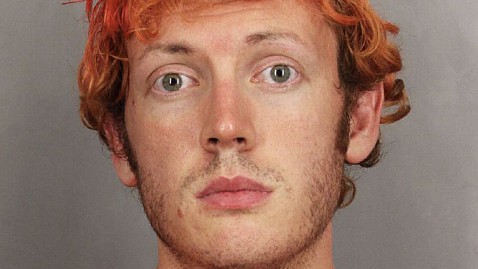Prosecutors Drop Fight for Aurora Massacre Suspect's Notebook

Arapahoe County Sheriff's Office
ABC News' Clayton Sandell and Carol McKinley report:
CENTENNIAL, Colo. - Prosecutors in the Aurora theater massacre case changed legal course today, dropping their effort to see a notebook that James Holmes mailed to his psychiatrist Lynne Fenton the day before he allegedly opened fire, killing 12 and injuring 58.
Holmes, 24, appeared clean cut in court, with short, closely- cropped brown hair. The infamous orange hair and long sideburns are now gone. Holmes seemed to sometimes pay attention to today's proceedings, occasionally staring wide-eyed around the courtroom.
Prosecutors had argued that they should be allowed to see the notebook, arguing that Holmes' relationship with Dr. Fenton ended on June 11. Holmes' defense team, however, said in a previous hearing that Holmes tried to reach Fenton nine minutes before the July 20 massacre, suggesting he may not have considered their relationship over.
Prosecutor Rich Orman said that even if they did win the argument that the notebook was not protected by doctor-patient confidentiality, that would likely result in a long delay in an appeal to the Colorado Supreme Court.
"We are in uncharted legal waters," Orman said.
Orman also told Judge William Sylvester that the issue of privilege will likely become moot because if Holmes pursues an expected insanity defense, he will automatically waive privilege, giving prosecutors access to the notebook.
"Any privilege that exists with the notebook will be waived in the future," said Orman.
Defense attorneys will soon be granted access to the notebook, where they will be able to read and photograph whatever is inside.
Defense attorneys have said in previous court hearings that Holmes is mentally ill.
"I am surprised at this development, because this district attorney usually fights for everything. But I'm also not surprised, because other district attorneys have seen this fight as being a waste of time," said David Kaplan, a criminal defense attorney and former head of the Colorado Public Defenders Office.
Holmes' defense attorneys also asked the judge to level sanctions on prosecutors for making false and misleading statements about the case.
In previous hearings and in court documents, prosecutors have alleged that Holmes threatened a professor and was banned from the University of Colorado campus where he was a neuroscience graduate student. Public defender Daniel King said none of that was true.
"There was no iota of evidence to support allegations that Mr. Holmes threatened anyone or was banned for campus," King said.
King asked the judge to allow the defense team to release a statement to the media to correct information he called "flagrant and untrue."
The judge did not immediately issue a ruling on the statement or possible sanctions.